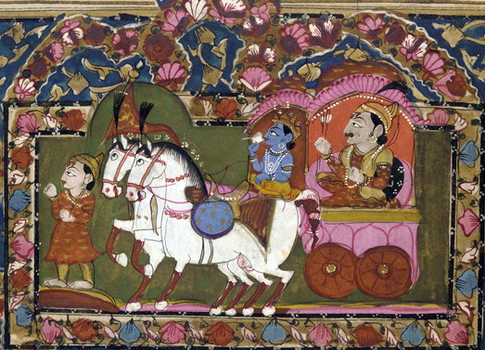The Bhagavad-Gita, often shortened Gita, mean “The Song of the Blessed” is originally a poem in the larger philosophical work of the Mahabharata in India. The original work is as old as or older then early Buddhist works. Though a poem originally it has been added to and made a larger “epic” work. The poem is a story of two families warring over an area that they both have claims to. As the battle is about to ensue one of the leaders of the one family hesitates to attack at the sight of his cousins in the other’s ranks. He confesses his dismay to the god Arjuna, who happens to be his chariot driver. This blesses the man as Arjuna later revels himself. The book deals with some issues of the nature of God, having seeming conflicting issues but possibly just presenting God’s manifestation in two ways. The first seems to be on of the entire universe and above it in a spiritual way. The second is a God that works in the matter of the work and acts through the matter. This distinction seems loose between the two as God seems to control the world as a “puppet show” in some of the later works. God’s manifestation is not the only concept addressed, as the actions of people towards God are addressed as well. God’s grace is another topic and deems to be one of knowledge of God. If God is known, one will experience Divine grace, a concept also expressed in the Upanishads (another India religious text). The other major idea in the Gita is salvation. At the end of the story two forms of salvation are expressed. The first is a system of withdrawal from the world to seek knowledge. These seems to be the “knowledge of God” one of knowing the separation of the spiritual and the material. The other way of salvation, actually given to be superior, is to act on duty alone, to commit oneself fully to the teaching of the Gita.
It is thought that the fist author had no influence of Buddhism or Christianity, but later redactors were influenced by these philosophies.
It is thought that the fist author had no influence of Buddhism or Christianity, but later redactors were influenced by these philosophies.
The Bhagavad Gita (2.20-25)
Krishna to Arjuna on the Immortality of the Soul (Atman):
The Atman is neither born nor does it die at any time, nor having been it will cease to exist again. It is unborn, eternal, permanent, and primeval. The Atman is not destroyed when the body is destroyed. O Arjuna, how can a person who knows that the Atman is indestructible, eternal, unborn, and imperishable, kill anyone or cause anyone to be killed? Just as a person puts on new garments after discarding the old ones, similarly Atman acquires new bodies after casting away the old bodies. Weapons do not cut this Atman, fire does not burn it, water does not make it wet, and the wind does not make it dry. It is eternal, all pervading, unchanging, immovable, and primeval. The Atman is said to be unmanifest, unthinkable, and unchanging. Knowing this Atman as such you should not grieve.
Krishna to Arjuna on the Immortality of the Soul (Atman):
The Atman is neither born nor does it die at any time, nor having been it will cease to exist again. It is unborn, eternal, permanent, and primeval. The Atman is not destroyed when the body is destroyed. O Arjuna, how can a person who knows that the Atman is indestructible, eternal, unborn, and imperishable, kill anyone or cause anyone to be killed? Just as a person puts on new garments after discarding the old ones, similarly Atman acquires new bodies after casting away the old bodies. Weapons do not cut this Atman, fire does not burn it, water does not make it wet, and the wind does not make it dry. It is eternal, all pervading, unchanging, immovable, and primeval. The Atman is said to be unmanifest, unthinkable, and unchanging. Knowing this Atman as such you should not grieve.

 RSS Feed
RSS Feed